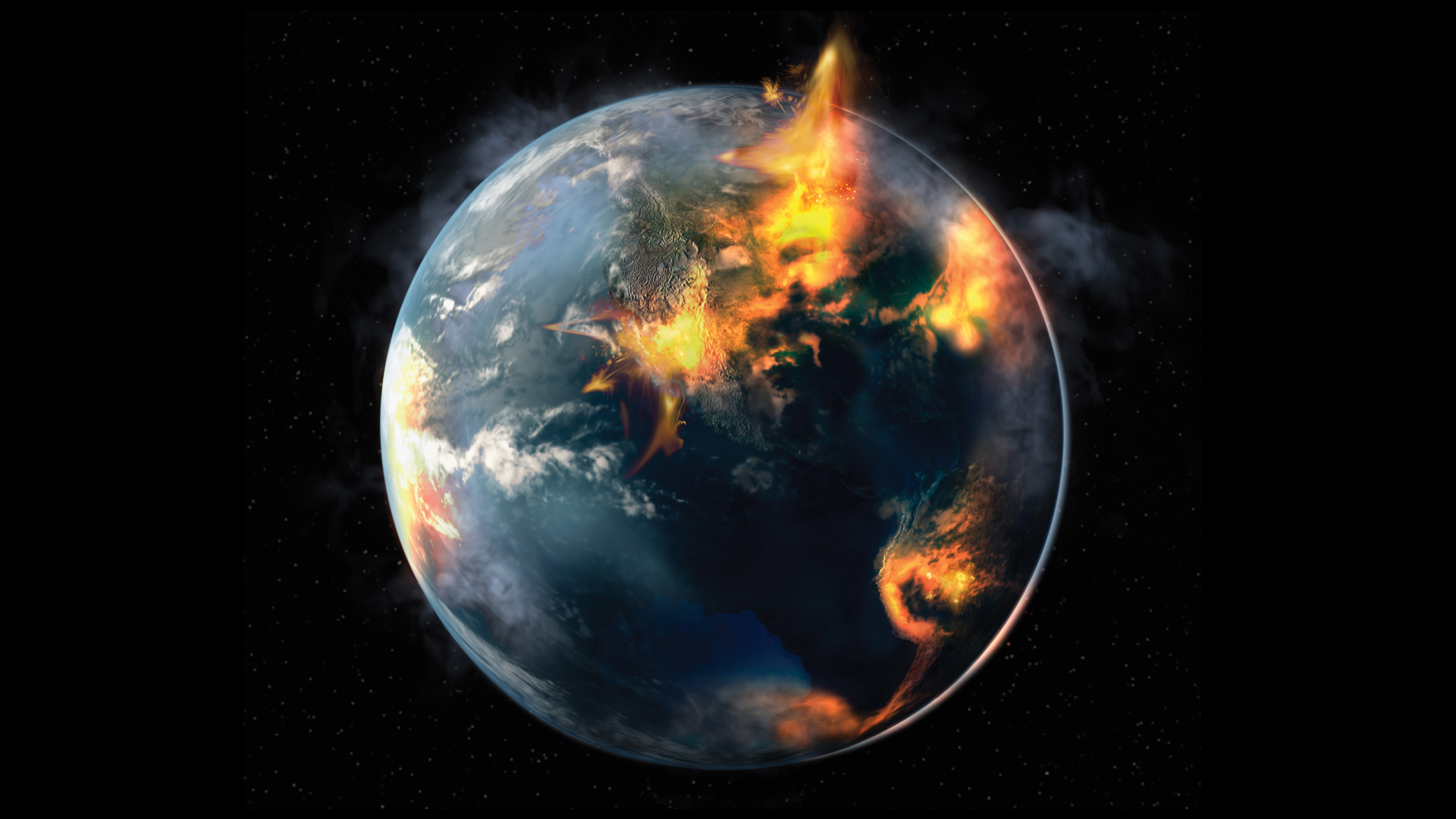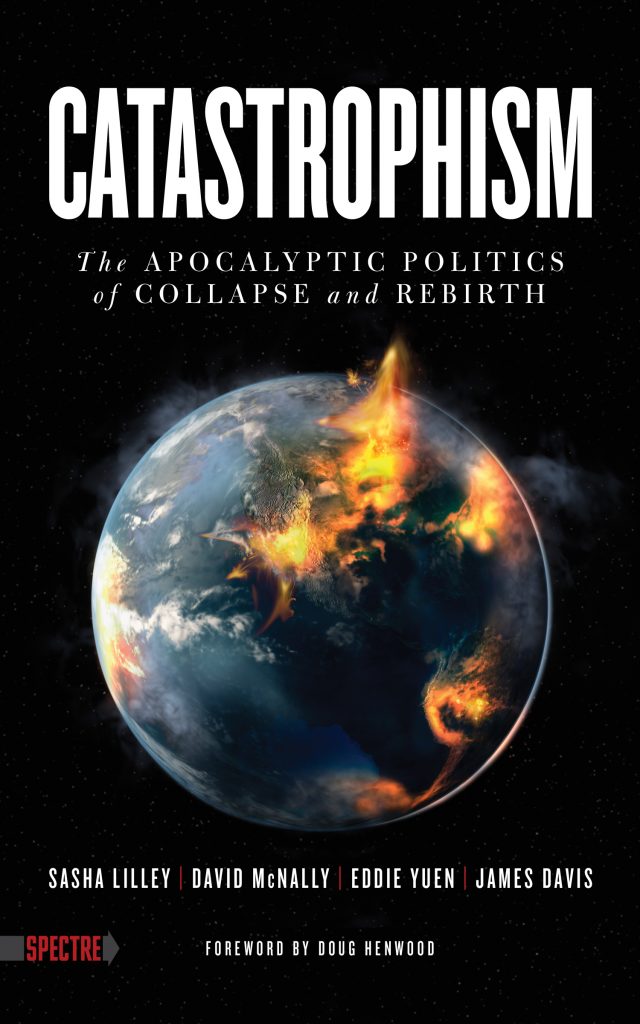By Thomas Cheney
Socialist Studies
Summer 2014
The essays in this timely volume are built around the theme that the politics of fear, or catastrophism, are ultimately unproductive and even reactionary. In her introductory essay to Catastrophism, Sasha Lilley cautions that a left alternative to capitalism — one that can respond adequately to a series of contemporary crises, including environmental and economic ones — cannot give in to fear and the ‘logic of catastrophe.’ She warns, “the politics of fear … play to the strengths of the right, not the left” (p. 3). Each chapter confronts catastrophism in different and complementary ways. Eddie Yuen describes the failure of catastrophism for the environmental movement. Lilley offers a history of the dangers of catastrophism in leftist politics, while James Davis chronicles the history of right wing fear-mongering and apocalypticism. The concluding essay by David McNally connects the cultural phenomenon of zombies with the catastrophes of everyday life in capitalism.
Yuen’s essay challenges the environmental movement to adopt different and more productive narratives about climate change and possibilities for its reversal. While not denying that a catastrophe is indeed impending, Yuen points to the paradox that increased individual knowledge about climate change does not result in increased political engagement. The problem, he holds, is that mainstream accounts of global warming “follow compelling evidence for ecological collapse with woefully inadequate injunctions to green consumption or lobbying of political representatives” (p.19). Yuen’s alternative begins with jettisoning the Malthusian logic that penetrates so much of contemporary ecological thinking. He rejects the idea that ecological and social crises are the result of scarcity as an ideological construction that ultimately reinforces the status quo. By transcending the idea that it is a unified ‘us’ that is responsible for climate change, Yuen suggests that the class and geographical dynamics of ecological devastation and its burdens may come to light. Yuen’s contribution provides a pragmatic assessment of the failures of contemporary ecological movements, while also maintaining optimism that an eco-socialist politics can provide an alternative to capitalist alienation and environmental destruction. Refreshingly, Yuen does not rely on productivist mystifications, arguing instead that a better life can be had with less consumption.
Shifting focus, Lilley’s chapter offers a critique of what she terms the “left catastrophist dyad” (p. 44). While each side of this dyad represents deep political despair and an insistence that a better future can be born only out of complete collapse, they differ insofar as one is deterministic, the other voluntaristic. The former, writes Lilley, is premised on the notion that capitalism will “inevitably collapse under its own weight…” (p. 46). Not only is this conception untrue to Marx’s analysis of capitalism it also results in both adventurism and quietism at the expense of an emphasis on class struggle. The voluntaristic pole of the dyad, Lilley argues, is characterized by the idea that “the worse things get, the better they will be for revolutionary prospects” (p. 54). This counterfactual notion has been mobilized by leftists throughout the 20th century — from the Weathermen, to primitivists such as Derrick Jensen, to the eccentric Trotskyist Juan Posadas — without political success. As an alternative, Lilley suggests taking seriously Theodor Adorno, who warned against “seeing the world in such grim terms that only an exterior force could change it” (p. 75-6).
In his contribution, James Davis argues that the notion society is headed for some sort of collapse — be it environmental, economic, social or spiritual — characterizes right wing catastrophism. This essay centres on a distinction between those catastrophists who see collapse as the disease of progressive and democratic advancements such as feminism and multiculturalism (Leo Strauss, for example) and those who take the argument a step further and see total collapse as the necessary cure (the Norwegian terrorist Anders Breivik). Taking up Lilley’s warning about the politics of fear, Davis examines the ways that the state manipulates fear to increase its power. He concludes with the warning that in a conjuncture saturated by catastrophic discourses, the right can use this hysteria to its benefit while for the left catastrophism is far less productive.
McNally’s essay takes the analysis in a more creative direction, exploring the cultural obsession with zombies. According to McNally, this fixation is the reflection of a class politics that debases workers’ bodies. In the 21st century, two representations of the zombie come together in a dialectical encounter: “In… the maniacally insatiable flesh-eater, we find the capitalist zombie, driven to relentlessly consume human beings. [I]n the image of the zombie labourer we encounter the reality of the global collective worker reduced to a beast of burden who keeps the machinery of accumulation ticking” (p. 123). This chapter is much less explicitly about catastrophism, and appears to wander much further from the main theme of the book than do the others. However, McNally is not so much concerned with doomsday scenarios as he is with the “catastrophic texture of everyday life” in capitalist society (p. 126). The cultural preoccupation with zombies reveals this ‘catastrophic texture.’ In this way, McNally’s optimistic conclusion provides a fitting culmination of the book: “We need… to uncover the social basis of all that is truly horrifying and catastrophic about our world, as part of a critical theory and practice designed to change it” (p. 127).
The essays in this book each present a sophisticated and nuanced analysis of the politics and discourses of catastrophe. While the message is that the left must not succumb to catastrophic panic and the politics of fear, the authors do not deny that we do indeed live in a catastrophic age. It is not the time, however, for the left to indulge in apocalypticism, to resign itself to the notion that a better society will arise only from the ashes of the current barbarism. This insistence reflects the sober optimism offered by this collection of essays. Accessibly written and rich in analysis, this volume has much to offer any student of contemporary politics.
Back to Sasha Lilley’s Author Page | Back to David McNally’s Author Page | Back to Eddie Yuen’s Author Page | Back to James Davis’s Author Page







